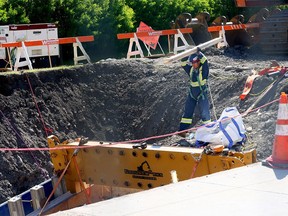City needs to take stock of practical, public implications of what happened and how it reacted
Article content
For the past four weeks, Calgary has been in the grips of a water emergency no ordinary person could have imagined ever happening.
Advertisement 2
Article content
We seem to be nearing the end of the crisis that began June 5 with a break in the pipe that normally delivers drinking water from the Bearspaw treatment plant to a huge swath of Calgary and communities beyond.
Now, with water main repairs complete and the city’s drinking water supply expected to be slowly restored this week, we can start to take stock of how everything was handled.
Sure, there will be some kind of panel to evaluate the technical side of things — namely, how could it be that a supposedly carefully monitored water feeder main ruptured without warning only halfway into its lifespan?
But another look is also needed regarding the practical, public implications of what happened and how the city reacted.

By the morning of June 6, Day 2 of the water crisis, an emergency alert blared out onto our mobile devices, radios and television sets.
Article content
Advertisement 3
Article content
“All residents and businesses must conserve water,” the text of the alert warned. “Do not shower or (bathe). Do not wash dishes, or run appliances that use water.”
Alarmingly, at a news conference later that same morning, city officials had a different message. It wasn’t that we couldn’t do those things, we just had to be careful about them, they said.
Officials would eventually tell us outdoor water use was prohibited. Fair enough, and simple to understand.
But they also said indoor water consumption needed to be shaved by 25%. To most people, that was a useless metric, nearly impossible to quantify.
After a couple days of flailing, the mayor apologized and the city’s message started to improve somewhat — and it started when people were finally given examples of what decreased water use could look like.
Advertisement 4
Article content
Continued city watering was a bad look
One bit of optics the city could never fix was the continued watering of plants and golf courses.
Those of us who hang on every word spilling out of the mouths of people in charge were fully aware the water wasn’t treated and couldn’t be used for drinking. But I suspect a number of people unable or unwilling to follow the news as closely might have mistakenly taken continued water use for public spaces as a sign that everything was OK, even though things were only slowly moving toward normal as of Canada Day.
Even as late as Monday morning, the city demonstrated it hadn’t quite figured it out: During Mayor Jyoti Gondek’s 8:30 a.m. update, she mentioned a recent uptick in the number of calls to 311 about cloudy water, or turbidity.
Advertisement 5
Article content
This is a normal side-effect of pressure changes in water pipes, directly linked to the methodical restoration of water service. Officials could have warned Calgarians ahead of time and perhaps headed off some of those concerned phone calls.

Not surprisingly, this was the same problem as on Day 1, when changes in pressure due to the initial water main break led to adjustments in how drinking water was being delivered to homes and businesses. A heads-up then would have quelled concerns, too.
But it wasn’t all bad: City water crews on the ground and contract workers were going as quickly as they could to help get things back to normal.
And it seems the vast majority of people were ready, willing and able to do their part, cutting back on water use during this extended emergency.
The majority of Calgarians can take credit for being a bright spot throughout the crisis, with a cross-border tip of the hat to San Diego County for shipping two pipe segments for the repair.
The people held up their end of the bargain. Now it’s the city’s turn to clearly and openly explain what the hell happened.
Recommended from Editorial
Article content

